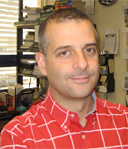About us
LA-iMageS has been developed by the collaboration of:
SING

Florentino Fdez-Riverola, PhD
se.ogivu@alorevir
The Next Generation Computer Systems Group (SING) brings together a reduced number of researches with the aim of developing intelligent models and deploying them in real environments. The expertise of the members comes from different areas related with previous research in developing symbolic, connexionistic and hybrid AI systems, solving security problems, administration of networks, e-commerce, VoIP, implementation of web applications and developing systems working with documental data bases. The projects carried out by the SING group always follow a practical point of view, but taking into consideration the formal aspects needed in any research work. Indeed, most interesting techniques employed in previous works cope with the utilisation of case-based reasoning, artificial neural networks, fuzzy logic, rough sets, intelligent agents and multi-agent systems.
Bioscope Group

José Luís Capelo-Martínez, PhD
moc.liamg@molepaclj
The current research and focus areas of the Bioscope Group include Bio-analytical applications for Protein Identification and Proteomics as well as in organic and inorganic nano-synthesis. Among others, they develop new approaches for in-gel and in-solution protein identification throughout ultra-fast protein digestion and mass spectrometry-based techniques, new strategies for tissue sample preparation prior Mass Spectrometry Imaging of endometriosis tissues and prostate cancer tissues, faster and more efficient sample preparation methods for identification and quantification of antidoping substances, new methods to identify doping abuse biomarkers by MALDI-TOF-MS and MALDI-TOF-TOF-MS, new methodologies for protein quantification by stable isotopic labelling techniques and mass spectroscopy, new methods for bacterial identification by MALDI-TOF-MS with application in disease screening and bioterrorism combat.
GEPAM

Marco Aurélio Zezzi Arruda, PhD
rb.pmacinu.mqi@izzez
The main research lines of GEPAM include bioanalytical with emphasis on proteomics and metallomics, mass (ICP-MS, LA-ICP-MS, MALDI-QTOF-MS, ESI-MS, TWIMS) and atomic spectrometry (ICP OES, ETAAS, FAAS, TS-FF-AAS), sample preparation, forensic and mechanization. The current research interests of the group include trans-disciplinary work involving speciation analysis and comparative omics of plants (i.e. soybean, sunflower, Arabidopsis Thaliana) and human body fluids (i.e. blood serum, urine, saliva) to identify possible biomarkers for transgenic species and human diseases, as well as to evaluate reactive oxygen species production, and (metallo)proteins responses under stress in a given system. Researches involving images through LA-ICP-MS is another key point inside the group, with the development of different strategies for improving sampling and quantification.
Team members
- Marco Aurélio Zezzi Arruda (GEPAM Group).
- Gustavo de Souza Pessôa (GEPAM Group).
- José Luís Capelo-Martínez (Bioscope Group).
- Florentino Fdez-Riverola (SING Group).
- Miguel Reboiro-Jato (SING Group).
- Hugo López-Fdez (SING Group).
- Daniel Glez-Peña (SING Group).
Acknowledgements
This work was partially funded by the INOU16-05 project from the University of Vigo.